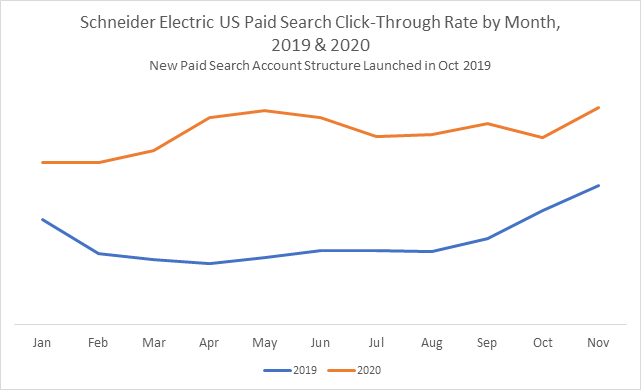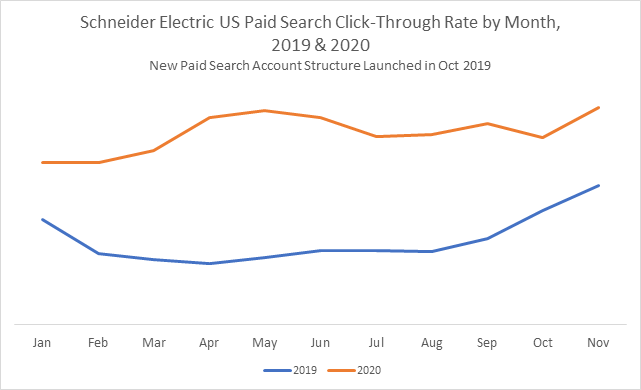30-second summary:
- Digital change affords organizations chances to make genuine connections with customers through individualized marketing experiences.
- Digital buyer behavior is altering, with increased consumer expectations for digital-only interactions and minimized tolerance for traditional sales techniques like cold-calling.
- Paid search is a fast-growing channel that warrants a data-driven method to method and execution.
- Evan Kent, VP Integrated Marketing at Schneider Electric, and Kimberly Dutcher, SEM Manager at Merkle share their collaborative method to a paid search technique redesign that continues to drive favorable business outcomes.
There’s no more rejecting that digital improvement is here. It’s on the mind of every business leader, changing how organizations utilize digital technologies and arrange their business designs to produce more worth for their brand name. In the marketing space, digital transformation pays for organizations countless chances to make a genuine connection with customers through individualized marketing experiences. By developing company, strategy, and technology around digital transformation, brands can ultimately deliver consumer experiences that are contextually relevant and personally notified.
Schneider Electric and its paid search partner of 5 years, Merkle, took on the digital transformation difficulty head-on in 2019. They took part in a more purposeful method than ever before to revamp the brand’s method to paid search marketing in an effort to align with business’s general digital transformation efforts.
Diving into digital change
Schneider Electric’s function is to empower everyone to make the most of their energy and resources, bridging development and sustainability for all. As the international expert in energy management and automation, it is business’s mission to be a digital partner for sustainability and effectiveness. To support this objective, the Schneider Electric team acknowledged an immediate need to redesign their search marketing program to improve the quality of traffic driven to the site.
With current changes in digital buying habits, the Schneider Electric team rapidly recognized that general search volume was outmatching their financial investment. The market was growing, yet Schneider Electric’s investment was diminishing. The brand’s soft voice in the market was intensified by a siloed technique to marketing financial investment. Paid search programs were defined by offered investment from service systems (BUs) versus starting with the offered search volume and after that specifying an investment requirement. This led to projects that were under-funded, chasing after search volume that merely did not exist, and a basic absence of evergreen brand name paid search.
The Schneider Electric team decided it was time for a modification. To fix its internal difficulties, the business developed a team of dedicated search specialists to work side-by-side with its digital agency, Merkle. These professionals are the link in between deep knowledge of Schneider Electric’s audiences and account optimization. The Schneider Electric paid search group made a deliberate shift from creating and running reactive paid search projects to proactive market and industry-based planning. Their search objective altered to focus on traffic, landing pages, and the fundamental requirement to respond to the concerns searchers have.
Unifying digital transformation with paid search
Having worked with Schneider Electric for 5 years on paid search, the Merkle SEM group had valuable historical details on the business and its paid search patterns. This information was vital to proposing a combined, centrally budgeted paid search account structure for the United States. The restructure evolved Schneider Electric’s United States paid search program from 14 paid search accounts and 22 spending plans for seven BUs to one account with one budget plan. This drove significant performance improvements and permitted a robust test-and-learn environment.
The account redesign was also a chance for the unified paid search group across Schneider Electric and Merkle to prepare for future paid search marketing growth and success. For the very first time, the groups had the ability to take a big-picture, data-driven, tactical method to the channel that gave all celebrations the details they required to drive huge results for business, rather than driving localized outcomes for specific BUs.
Key levers for successful improvement
1. Keywords
In producing a transformed United States paid search account lined up to Schneider Electric’s service objectives of driving the ideal search traffic to the ideal pages on the site, the unified paid search group wasn’t beginning with fresh start. Years of historical data and analysis assisted direct the groups on which keywords were historically the very best performing. In the case of this paid search digital improvement, a keyword audit was a crucial piece to start with, guaranteeing the group was concentrated on the ideal keywords for the brand and its critical items and options. Click-through rate (CTR) and cost per click (CPC) were the team’s primary crucial performance signs (KPIs), provided the strong historical information in the engine and the broad breadth of optimization levers that might assist improve those metrics in the early phases of account optimization.
2. URLs
The unified paid search team took a two-pronged preliminary approach to their paid search last URL selection. The group worked to recognize whether they had appointed the most appropriate URLs for the keywords. Improving quality rating was an important KPI, as the quality rating is a major consider how typically and how high your advertisements reveal on the online search engine results page (SERP). Second, the Schneider Electric paid search group translated the quality score for the Schneider Electric web team to enhance general page quality and user experience on the site. It is these types of cross-channel partnerships that are necessary to drive continued marketing success; business’s digital transformation can’t be successful without it.
3. Effectiveness metrics and results
Consistent monitoring and optimization of the group’s top-level KPIs, CTR, and CPC is what eventually drove success for business. Throughout 2020, the paid search team drove a 137 percent year-over-year increase in CTR through keyword audits, URL audits, ongoing performance optimizations, and flexible allowance of budget plan to the most efficient keywords. Collaboration with the Schneider Electric website analytics team was critical for measurement too, with bounce rate and website engagement ending up being key user experience measurement metrics.

Continually progressing paid search with digital change In 2020, the very first year of the change, the paid search group was focused on
Designing this customer-first method took some time and optimization is an iterative process, but the outcomes have actually been rapid:
- Lower cost per click
- More traffic to the site
- Searchers go deeper into the website
Now that the paid search team has a strong foundation, the door is open for experimenting with new and advanced search methods to more optimize audiences, bidding strategies, and cross-sell chances. With the right traffic coming to the website, the group can concentrate on monetizing that traffic by determining and driving site engagement, leads, and contribution to earnings. Paid search is no longer a guessing game– statistical and data-driven methods are used to enhance financial investment.
With a variety of 2021 paid search marketing patterns emerging, particularly around automation in the market, the Schneider Electric and Merkle paid search team is delighted to go into what chances exist for additional growth of their marketing efforts. B2B advertisers are changing the method they play the search marketing game in 2021, and those who innovate early and often are the ones who increase to the obstacle, and, ultimately, capitalize on the opportunity.
Evan Kent is VP Integrated Marketing at Schneider Electric and Kimberly Dutcher is SEM Manager at Merkle.

